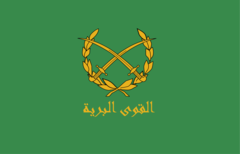Difference between revisions of "Syrian Arab Army"
(Inaugurating) |
(Added: type.) |
||
| Line 3: | Line 3: | ||
|image_width=240px | |image_width=240px | ||
|wikipedia=https://en.wikipedia.org/wiki/Syrian_Army | |wikipedia=https://en.wikipedia.org/wiki/Syrian_Army | ||
| + | |type=Army | ||
}} | }} | ||
The '''Syrian Arab Army''' ('''SAA''') is the dominant military service of the four uniformed services in [[Syria]], controlling the most senior posts in the armed forces, and has the greatest manpower, approximately 80 percent of the combined services. The SAA originated in local military forces formed by the French after World War I, after [[France]] obtained a mandate over the region.<ref>Kenneth Pollack, ''Arabs at War'', 2002, p.447''</ref> It officially came into being in 1945, before Syria obtained full independence the following year. | The '''Syrian Arab Army''' ('''SAA''') is the dominant military service of the four uniformed services in [[Syria]], controlling the most senior posts in the armed forces, and has the greatest manpower, approximately 80 percent of the combined services. The SAA originated in local military forces formed by the French after World War I, after [[France]] obtained a mandate over the region.<ref>Kenneth Pollack, ''Arabs at War'', 2002, p.447''</ref> It officially came into being in 1945, before Syria obtained full independence the following year. | ||
Revision as of 14:58, 1 September 2017
 | |
| Type | 40px Army |
The Syrian Arab Army (SAA) is the dominant military service of the four uniformed services in Syria, controlling the most senior posts in the armed forces, and has the greatest manpower, approximately 80 percent of the combined services. The SAA originated in local military forces formed by the French after World War I, after France obtained a mandate over the region.[1] It officially came into being in 1945, before Syria obtained full independence the following year.
Since 1946, it has played a major role in Syria's governance, mounting five military coups (two in 1949, including the March 1949 Syrian coup d'état and the August 1949 coup by Colonel Sami al-Hinnawi), and in 1954, 1963, 1966, and 1970. It has fought four wars with Israel (1948, the Six Day War in 1967, the October War of 1973, and 1982 in Lebanon) and one with Jordan (Black September, 1970). An armoured division was also deployed to Saudi Arabia in 1990–91 during the Persian Gulf War, but saw little action. From 1976 to 2005 the SAA was the major pillar of the Syrian occupation of Lebanon. Internally, it played a major part in suppressing the 1979–82 Islamist uprising in Syria, and since early 2011 has been heavily engaged in fighting Western-backed insurgents and Islamic State terrorists.[2]
References
- ↑ Kenneth Pollack, Arabs at War, 2002, p.447
- ↑ Document:Washington Wants Syria's Oil